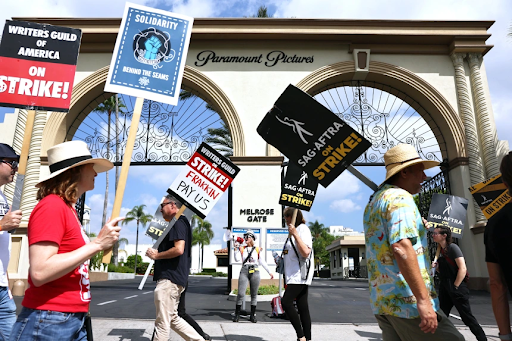Source: NBC News
Throughout the history of the Writers Guild of America (WGA), the labor union representing thousands of film and television writers working in Hollywood and elsewhere within North America, the longest it had ever been on strike was a total of 154 days, a record set by a strike that took place in the year 1988. Roughly thirty-five years later, that record looked as if it were about to be broken, with this latest strike seeing the guild taking to the streets and picketing for a total of 146 days. However, despite there being over a week before such a record could be surpassed, this strike appears to have finally come to an end. After months of striking against the Alliance of Motion Picture and Television Producers (AMPTP), the organization serving on behalf of the various major Hollywood studios from Disney to Warner Bros., representatives from both organizations were able to sit down over the weekend to renegotiate their terms and, in the case of the former, strive to secure better working conditions for every member of the guild. If the announcements made during the evening of Tuesday, September 26th are any indication, there’s a strong chance that an agreement that almost everyone can be happy with has been reached.
“WGA has reached a tentative agreement with the AMPTP,” the WGA declared in a statement released that night after months of uncertainty as to whether or not the AMPTP would become willing to give in to its demands, further claiming that “this was made possible by the enduring solidarity of WGA members and extraordinary support of our union siblings who joined us on the picket lines for over 146 days”. With the WGA West Board and the WGA East Council recently voting in favor of the new terms offered by the AMPTP, the deal will now need to be ratified by a majority vote from the entirety of the WGA, and given the optimistic spirit currently prevalent throughout much of the guild, ratification appears to be all but guaranteed. “We can say, with great pride, that this deal is exceptional”, the WGA’s negotiating committee claimed in its official statement, “with meaningful gains and protections for writers in every sector of the membership.”
It took five days for negotiations between WGA negotiators and the heads of the studios included in the AMPTP (a group that includes the likes of Netflix’s Ted Sarandos and NBCUniversal chairman Donna Langley), but it appears that those five days were relatively well spent. Even Los Angeles mayor Karen Bass seemed quite enthusiastic about the studios hopefully getting back up and running better than ever, claiming in an official statement that the time has come to “focus on getting the entertainment industry, and all the small businesses that depend on it, back on their feet and stronger than ever before.”
However, what Bass failed to acknowledge in her statement is that while one major Hollywood strike may have its conclusion in its sights, another one still lingers over the industry and continues to keep it at a standstill for the time being. That strike is currently being held by the Screen Actors Guild – American Federation of Radio and Television Artists (SAG-AFTRA), an even larger Hollywood union representing the thousands of film and television performers working in the various productions that take place throughout the nation. At the current time, representatives of both SAG-AFTRA and the AMPTP have yet to sit down to discuss a contract of their own; while the former is fighting to address many of the same issues that the WGA brought forth in its own negotiations (from residual payments to protections against the usage of artificial intelligence, or AI, in certain media), there are those that are more exclusive to the plight of SAG-AFTRA’s members (such as concerns regarding self-tape auditions) and may be more difficult for the AMPTP to agree to. Despite all this, SAG-AFTRA was nonetheless fully supportive of the WGA when it announced it had reached a potential bargain with the AMPTP, releasing a public statement that congratulated the writers and expressed hope that a similar deal can be released for its own guild members. “We remain on strike in our TV/Theatrical contract and continue to urge the studio and streamer CEOs and the AMPTP to return to the table and make the fair deal,” the statement read.
One can only hope that the time it takes for the AMPTP and SAG-AFTRA to reach an agreement isn’t as long as the time it took for the former to reach with the WGA, especially given the immense financial toll these strikes have taken on just about everyone working within the industry. Thousands of people working on the several different film and television productions that were previously taking place had to be deprived of their ability to do their jobs and receive compensation for their labors due the strikes shutting them all down, and countless interviews with writers, actors, and other behind-the-scenes crew members have described the various financial struggles that they’ve had to go through during this time, even though many of them are adamant that the strikes are worth all this trouble. Of course, the studios, despite having far more financial resources to fall back on at the moment, have also taken a noticeable financial hit as a result of the ongoing strikes, with Warner Bros., for example, allegedly losing as much as $500 million from their inability to produce new films and television programs.
The last time a major strike had this great of an effect on the film industry was in 2007 when the WGA had its last strike, and even then, SAG-AFTRA wasn’t striking alongside them. The dual strike that, for the time being, continues to push onward, is a noteworthy reminder of just how much Hollywood has gone through over the past decade or so. Regular broadcast viewership has subsided in favor of online streaming, and AI technology threatens the opportunity for actual human creatives to produce something that can be enjoyed by the masses. Nobody wanted these strikes to take place, but they have proven necessary regardless, and hopefully, the AMPTP and all the studios it represents will come to terms with how this ever-changing media landscape will force them to change its business practices and how it treats those responsible for it staying afloat.




